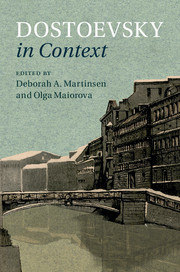Book contents
- Frontmatter
- Contents
- List of illustrations
- Notes on contributors
- Acknowledgments
- Note on citation, transliteration, glossary, and dates
- Chronology
- 1 Introduction: the many worlds of Dostoevsky
- PART I SOCIAL, HISTORICAL, AND CULTURAL CONTEXTS
- i CHANGING POLITICAL, ECONOMIC, AND SOCIAL LANDSCAPE
- 2 The Great Reforms and the new courts
- 3 The abolition of serfdom
- 4 Punishment and crime
- 5 Socialism, utopia, and myth
- 6 Nihilism and terrorism
- 7 The “woman question,” women's work, women's options
- 8 The economy and the print market
- ii POLITICAL, SOCIAL, AND CULTURAL INSTITUTIONS
- iii SPACE AND PLACE
- iv RELIGION AND MODERNITY
- PART II LITERATURE, JOURNALISM, AND LANGUAGES
- Glossary
- Further reading
- Index
- References
8 - The economy and the print market
from i - CHANGING POLITICAL, ECONOMIC, AND SOCIAL LANDSCAPE
Published online by Cambridge University Press: 18 December 2015
- Frontmatter
- Contents
- List of illustrations
- Notes on contributors
- Acknowledgments
- Note on citation, transliteration, glossary, and dates
- Chronology
- 1 Introduction: the many worlds of Dostoevsky
- PART I SOCIAL, HISTORICAL, AND CULTURAL CONTEXTS
- i CHANGING POLITICAL, ECONOMIC, AND SOCIAL LANDSCAPE
- 2 The Great Reforms and the new courts
- 3 The abolition of serfdom
- 4 Punishment and crime
- 5 Socialism, utopia, and myth
- 6 Nihilism and terrorism
- 7 The “woman question,” women's work, women's options
- 8 The economy and the print market
- ii POLITICAL, SOCIAL, AND CULTURAL INSTITUTIONS
- iii SPACE AND PLACE
- iv RELIGION AND MODERNITY
- PART II LITERATURE, JOURNALISM, AND LANGUAGES
- Glossary
- Further reading
- Index
- References
Summary
The series of profound transformations which Russia underwent in the 1860s and 1870s, which included the emancipation of the serfs (1861) and reforms of the courts and local government or zemstvo* (1864) and which we now know as the Great Reforms, overlaid a major social and political restructuring on an already weak economic foundation. Russia's defeat in the Crimean War (1853–6) had sounded an economic as well as a political alarm call. The outdated muskets and warships, overwhelmed by the modern equipment of the English and French forces, attested to a chronically underinvested industrial base, a sclerotic civil service, and a labor market still based on feudal principles. The conflict sharply exposed the contrasts between Russia and the West. Construction of the railway network completed the industrial revolution in Europe: in Russia it heralded the beginning. In the early 1860s, Russia had laid just 1,500 km of track compared to 15,000 km in England. Russians who traveled abroad could see clear evidence of the economic gulf not just in transport, but in technology, entrepreneurial opportunity, and the availability of capital. Russia had hosted industrial exhibitions continuously since 1829, yet Dostoevsky's Underground Man chooses the 1851 Crystal Palace in London as his emblem of industrial progress (5:120; Pt. 1, Ch. 10).
Why had Russia allowed itself to lag so badly? A series of wars dating back to the Napoleonic invasion had depleted state coffers. Printing paper money in response had caused a collapse of the paper ruble, the assignatsiya, in 1817, heralding a century-long sensitivity to the discounted value of paper money compared to silver coin. The sheer size and climate of Russia's territory impeded industrial restructuring. The industrial base was fragmented both geographically and structurally, with few large enterprises and many urban trades and rural crafts traditionally operated by single traders. The Russian labor force became a byword for low productivity. Repeated demonstrations of social unrest in the West, particularly in France, suggested a link between urbanization, labor market reform, and political activism, which the authorities were not keen to import. A continuing war in the Caucasus (1817–64) further destabilized the budget and undermined the fragile economic gains of the 1830s. After the 1856 defeat in Crimea, the economic pressures to reform were, arguably, even stronger than the social and political pressures.
- Type
- Chapter
- Information
- Dostoevsky in Context , pp. 66 - 74Publisher: Cambridge University PressPrint publication year: 2016



